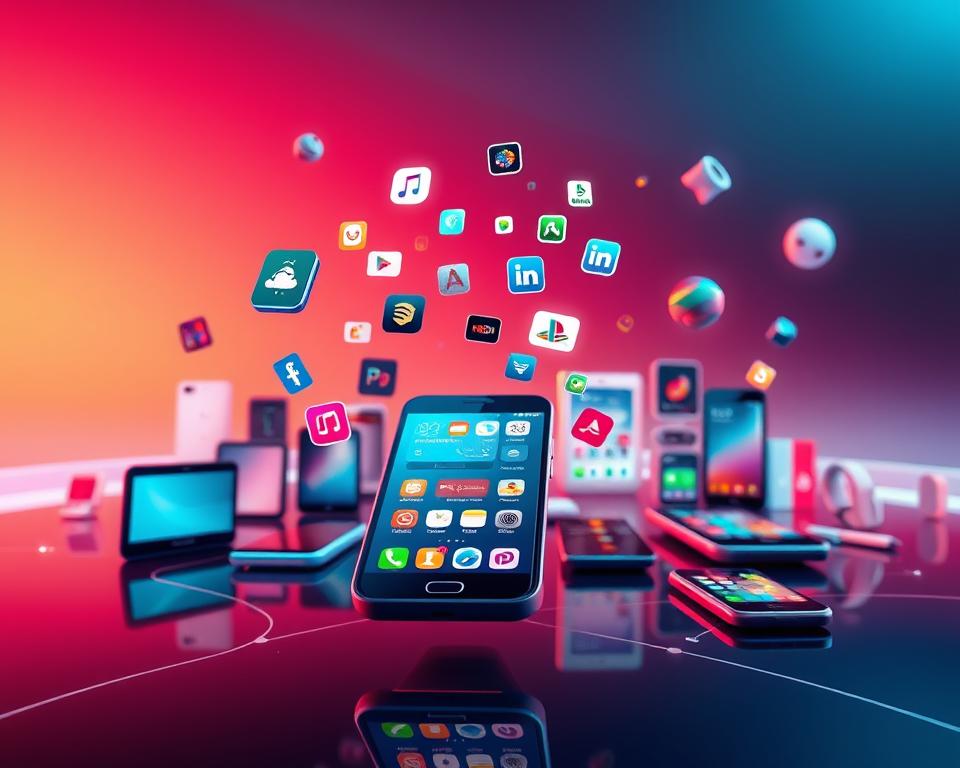
Exploring the Top Uses of Mobile Tech in an Essay
Did you know that as of 2023, over 6.8 billion people worldwide use a mobile device? This staggering statistic highlights the ubiquity of mobile technology in our lives, transforming how we communicate, learn, and even conduct business. From enhancing educational experiences to streamlining daily tasks, the best uses of mobile tech applications are reshaping society in remarkable ways. In this essay, we will delve into the significance of mobile technology, exploring its myriad applications, benefits, and its transformative impact across various sectors.

Key Takeaways
- Mobile technology significantly impacts global communication and connectivity.
- Educational enhancements are among the top benefits of mobile technology.
- Businesses leverage mobile tech applications for improved customer engagement.
- Mobile devices provide convenient access to information and services anytime, anywhere.
- Health care is transforming with telemedicine and mobile health applications.
- The future of mobile technology holds exciting innovations and trends.
Introduction to Mobile Technology
Mobile technology has revolutionized the way individuals connect and share information across the globe. The term mobile tech definition encompasses various portable devices, including smartphones, tablets, and smartwatches, designed to facilitate communication, data access, and information sharing anytime and anywhere. This transformation in communication methods allows users to stay connected through calls, texts, and social media platforms, bridging distances effortlessly.
A mobile technology overview reveals an impressive array of features integrated into modern devices. GPS systems, cameras, and advanced sensors have become commonplace, enhancing user’s daily experiences. These advancements not only improve personal connectivity but also enable businesses to reach customers in innovative ways. With the introduction mobile technology, daily life continues to evolve, making tools and resources more accessible than ever before.

What Are the Best Uses of Mobile Technology Essay
The rapid advancement of mobile technology has significantly transformed how people interact, work, and access information. This overview of mobile technology highlights various devices such as smartphones, tablets, and wearables, each offering unique features that enhance connectivity and overall efficiency. Understanding the best uses of mobile technology helps individuals harness these tools effectively, improving their personal and professional lives.
Overview of Mobile Technology
Mobile technology encompasses a range of devices and applications designed to facilitate communication and data access on the go. Smartphones, equipped with touch screens and numerous applications, enable users to stay connected through calls, text messages, and social media. Tablets bridge the gap between laptops and smartphones, offering larger screens for productivity, media consumption, and gaming. Wearable devices, like smartwatches and fitness trackers, monitor health and fitness metrics, providing real-time data to users. These diverse mobile tech applications have revolutionized the way individuals interact with each other and their environments.
Significance in Modern Society
The significance of mobile technology in modern society cannot be overstated. It has reshaped communication, making it instantaneous and accessible regardless of location. The best uses of mobile technology extend to various sectors, including business, education, and healthcare, streamlining processes and enhancing productivity. Businesses leverage mobile tech applications to improve customer engagement and operational efficiency. In education, mobile technology provides students with access to resources and immersive learning experiences. Overall, the impact of mobile technology fosters a more connected and informed society.

| Device Type | Primary Function | Best Uses |
|---|---|---|
| Smartphones | Communication and Multimedia | Social Networking, Navigation, Mobile Banking |
| Tablets | Productivity and Entertainment | Reading, Gaming, Video Streaming |
| Wearables | Health Monitoring | Fitness Tracking, Health Alerts, Notifications |
Mobile Technology in Education
Mobile technology education significantly transforms how students engage with their studies. This evolution paves the way for enhanced learning experiences, making educational materials more accessible and interactive. Through various platforms, educators can leverage mobile devices to cater to varied learning styles, which leads to improved comprehension and retention of information.
Enhancing Learning Experiences
By integrating mobile technology into the classroom, teachers create dynamic environments that foster engagement. Interactive apps and tools allow for personalized learning experiences that can adapt to the individual needs of students. These advancements help facilitate collaboration, enabling learners to connect with peers and educators in real-time.
Access to Educational Resources
With mobile devices, students gain access to a wealth of educational resources. eBooks, online articles, and multimedia content enrich the learning process. This easy access encourages exploration beyond traditional textbooks, broadening students’ horizons and enhancing their curiosity.
Mobile Learning Applications
Numerous mobile learning applications enhance educational tools available to students and teachers. For example, platforms like Duolingo or Kahoot boost engagement through gamification, making learning enjoyable and impactful. These applications offer unique features that cater to diverse educational needs, ensuring that students can achieve their best possible outcomes.

Mobile Technology Benefits
Mobile technology has transformed the way individuals navigate their daily lives, offering remarkable convenience and numerous accessibility benefits. Users can now connect with others quickly and access information anytime and anywhere through various mobile devices. This evolution has made time management and enhanced connectivity pivotal aspects of our modern existence.
Convenience and Accessibility
The convenience mobile technology provides is unmatched. People can order groceries, book appointments, or communicate with loved ones without needing to be at a desktop computer. For instance, platforms like Instacart or Uber allow users to handle errands and transportation directly from their smartphones. The accessibility benefits offered by mobile devices enable individuals to maintain productivity regardless of their location, making it easier to work from home or away.
Increased Productivity
With mobile devices, users can manage their schedules effectively and respond to work-related messages promptly. This capability fosters increased productivity, particularly in fast-paced environments where time is of the essence. Applications such as Todoist or Trello help individuals organize tasks and prioritize their responsibilities more efficiently, illustrating just how vital mobile technology is in achieving goals on-the-go.

| Benefit | Description | Example |
|---|---|---|
| Convenience | Enables users to perform tasks instantly from anywhere. | Ordering food via delivery apps. |
| Accessibility | Allows users to access information and resources at their fingertips. | Reading articles or e-books on mobile devices. |
| Productivity | Helps in organizing and managing time effectively. | Using calendars and task management apps. |
Mobile Technology Applications
Mobile technology offers a variety of applications that enhance everyday life. Significant advancements occur in communication tools, health and fitness tracking, and entertainment. These applications transform how individuals interact, monitor their well-being, and enjoy content.
Communication Tools
Mobile communication tools play a crucial role in facilitating connectivity among people. Apps for communication like WhatsApp and Slack enable instant messaging, providing platforms for both personal and business conversations. Video conferencing tools, such as Zoom, allow users to engage in real-time discussions regardless of distance. The rise of social media platforms like Facebook and Twitter has further transformed communication, fostering a sense of community and shared experiences.
Health and Fitness Tracking
Health and fitness tracking applications have gained popularity, allowing individuals to monitor their physical activities and well-being. Devices like smartphones and smartwatches leverage mobile technology to collect data on various fitness metrics. Users can track their progress through dedicated apps, receiving notifications and insights that encourage healthier lifestyles. Integration with social media adds a competitive edge, as users can share achievements with friends and family.
Entertainment and Media Consumption
Entertainment has evolved dramatically with mobile technology. Streaming services such as Netflix and Spotify offer convenient access to a wide range of media content. These platforms utilize mobile devices and apps for communication, offering personalized recommendations based on user preferences. This integration ensures that users can enjoy their favorite movies, shows, and music anytime, anywhere, enriching their entertainment experiences.
Importance of Mobile Technology in Daily Life
Mobile technology plays a pivotal role in shaping our daily routines, impacting numerous aspects through its significance. The importance mobile technology becomes evident when examining how it has transformed everyday tasks into efficient digital experiences. For instance, shopping has evolved with apps that allow users to browse and purchase items quickly, making consumer behavior more convenient and time-saving.
Banking has also experienced a major shift due to mobile innovations. Customers can access accounts, transfer funds, and pay bills with just a few taps. This advancement showcases the daily life applications of mobile technology, streamlining financial interactions in ways previously unimaginable.
Moreover, navigation has been revolutionized with reliable GPS services integrated into mobile devices. Users can easily find their way, locate nearby services, and receive real-time traffic updates. Such features illustrate everyday tech usage, as individuals incorporate these tools within their routines effortlessly.
In summary, the integration of mobile technology into daily life enhances efficiency, boosts productivity, and improves overall quality of life. Embracing these developments equips individuals with powerful tools to navigate their day-to-day activities smoothly.
Mobile Technology and Social Interaction
Mobile technology has revolutionized the way individuals connect and interact with one another. The rise of smartphones and various social media platforms has significantly changed how we maintain relationships online. People are no longer confined by geographical boundaries, fostering a sense of community through mobile socializing.
Building Connections
With social connections mobile technology provides, individuals can easily reach out and stay in touch with friends and family. Platforms like Instagram, Facebook, and WhatsApp allow users to share updates and experiences in real-time. This accessibility transforms casual acquaintances into deeper connections and provides the tools necessary to keep relationships thriving despite physical distance.
Impact on Relationships
The impact of mobile technology on relationships is profound. Individuals can maintain relationships online, breaking traditional barriers of communication. Mobile socializing encourages people to express themselves across various channels, leading to richer interactions. Furthermore, the ability to communicate through different formats—text, video, or images—adds layers of depth to conversations, enhancing emotional bonds. As a result, mobile technology not only simplifies but also enriches the process of building and maintaining meaningful connections.
Mobile Technology Advantages in Business
In today’s fast-paced market, mobile technology significantly enhances various business operations. Companies continue to leverage this technology for improved client interaction and to maximize business advantages. By utilizing mobile apps and effective marketing strategies, businesses can create a more engaging and personalized experience for their customers, fostering loyalty and satisfaction.
Improved Customer Engagement
Mobile technology plays a crucial role in enhancing customer engagement. Businesses can use mobile applications to send personalized notifications and offers directly to customers’ devices. This immediacy allows organizations to engage customers in real-time, catering to their preferences and needs. As a result, businesses enjoy stronger relationships and a higher level of customer loyalty.
Flexible Work Environments
Mobile technology provides companies with the flexibility to adapt their work environments. Remote work has become increasingly feasible due to advancements in mobile tools and applications. Employees can access documents, communicate with colleagues, and manage projects from virtually anywhere. This flexibility translates into increased productivity and employee satisfaction while contributing to overall business advantages.
Impacts of Mobile Technology on Society
The rise of mobile technology has dramatically transformed communication patterns. Traditional methods of interaction have evolved, allowing for faster and more efficient communication. In both professional and personal contexts, mobile communication has become the cornerstone of how individuals connect with one another, leading to notable societal changes.
Changing Communication Patterns
Mobile devices have redefined the way people communicate. Texting and instant messaging have surpassed phone calls in popularity. Look at some of the key changes:
- Increased reliance on messaging apps such as WhatsApp and Facebook Messenger
- Growth of social media platforms for sharing thoughts and experiences
- Shift towards visual communication through emojis, gifs, and videos
This shift has led to a world where immediate access to information and responses is the norm, altering interpersonal dynamics significantly.
Influence on Consumer Behavior
Mobile technology influences not just how we communicate but also how we buy and consume products. From shopping apps to mobile advertisements, the purchasing process has become more accessible. Consider the following points:
- Consumers now rely more on online reviews and social media recommendations to make decisions.
- Personalized advertising based on user data enhances targeted marketing strategies.
- Mobile payment technologies simplify checkout processes, encouraging impulse buying.
These changes in consumer behavior demonstrate how mobile communication plays a pivotal role in shaping buying habits, reflecting broader societal trends influenced by technological advancements.
Future of Mobile Technology
The landscape of mobile technology is transforming dramatically, promising an exciting horizon filled with potential. As users demand faster and more reliable services, future mobile technology will focus on integrating advanced systems that enhance daily life. Companies are working tirelessly to introduce cutting-edge features, driving the next phase of trends in tech.
Emerging Trends
Remote working and global connectivity are reshaping how we perceive communication. The advent of 5G networks accelerates data transfer rates and significantly reduces latency, enabling smoother experiences in various applications. With 5G, innovative applications emerge, allowing real-time interactions and enhanced multimedia experiences.
Potential Innovations
Advancements in augmented reality (AR) present new ways to interact with information seamlessly. Retailers are exploring AR applications to create immersive shopping experiences. Furthermore, mobile AI continues to evolve, providing intelligent solutions that personalize user experiences. These developments indicate a bright future, where mobile technology undoubtedly transforms routines into efficient, connected experiences.
Challenges of Mobile Technology
As mobile technology evolves, it faces significant challenges that need to be addressed for continued growth and user confidence. Two critical areas of concern are privacy and data security, which often dominate discussions surrounding mobile devices. As users increasingly rely on smartphones for daily activities, the risks associated with storing sensitive information become more pronounced.
Privacy and Security Concerns
Privacy concerns arise when personal data is collected and shared without user consent. Mobile applications regularly request access to contacts, photos, and location, leading many to question how their information is being utilized. Data security is paramount as breaches can expose sensitive data, making users vulnerable to identity theft and cyberattacks. Organizations must ensure robust security measures to protect user data, which can be challenging given the rapidly changing technological landscape.
Digital Divide Issues
The digital divide presents another set of mobile technology challenges. Not everyone has equal access to mobile devices or the internet, which creates disparities in opportunities. This lack of access can result in a significant gap in education, job opportunities, and social inclusion. Addressing these issues requires collaborative efforts from governments, organizations, and communities to ensure that mobile technology benefits all individuals, regardless of their socio-economic status.
Integrating Mobile Technology with Other Innovations
The intersection of mobile technology IoT and other advancements, such as artificial intelligence, creates numerous opportunities for smart devices and automated environments. This synergy promotes efficiency and enhances user experience in daily tasks. Understanding how these technologies interact and complement each other can shine a light on their future potential in various sectors.
Interactions with IoT
Mobile technology IoT fosters seamless connections between various devices. Through the Internet of Things, smart devices can communicate, share data, and collaborate to improve functionality. For instance, a smartphone can control home appliances like smart thermostats and lights, creating a cohesive ecosystem that enhances convenience and energy efficiency.
Collaborations with AI
Integrating mobile technology with artificial intelligence provides advanced capabilities. AI can analyze data collected by smart devices, enabling predictive features and personalized experiences. This collaboration enhances decision-making processes and facilitates automation in various applications, from smart homes to healthcare. Together, mobile technology and AI pave the way for innovative solutions that adapt to user needs.
| Technology | Functionality | Benefits |
|---|---|---|
| Mobile Technology IoT | Connecting various smart devices | Seamless control and communication |
| Artificial Intelligence | Data analysis and predictive capabilities | Personalized user experiences and automation |
| Smart Devices | Interactive and automated home and office environments | Increased efficiency and convenience |
Mobile Technology in Health Care
Mobile technology is revolutionizing health care by providing innovative solutions that enhance patient care. The integration of mobile technology in this sector enhances access to medical services and promotes better health outcomes. stands out as a remarkable aspect, offering various benefits that improve both patient and provider experiences.
Telemedicine Applications
Telemedicine is transforming the landscape of health care. This approach allows patients to consult with healthcare professionals without the need for physical visits. Patients can receive diagnoses, follow-ups, and even instant advice through their smartphones or tablets. This flexibility is particularly advantageous for those living in remote areas or facing mobility challenges.
Healthcare applications designed for telemedicine range from appointment scheduling to remote patient monitoring. These tools enable providers to keep track of patient health metrics and adjust treatments as necessary, all while patients maintain the ease of accessing their health data at any time.
Furthermore, telemedicine fosters a streamlined communication channel between patients and healthcare providers. With access to secure messaging platforms, patients can quickly reach out for guidance, ensuring timely intervention and reducing unnecessary hospital visits. The impact of mobile technology in health care continues to evolve, paving the way for more efficient, patient-centered care solutions.
Mobile Technology and E-commerce
Mobile technology has transformed the landscape of e-commerce, fostering a rapid rise in mobile e-commerce. Consumers now leverage their smartphones and tablets to access online stores, creating notable shifts in shopping trends and behaviors. Retailers, recognizing these changes, are adapting their strategies to enhance user experiences, aiming to boost convenience and satisfaction among shoppers.
Mobile Shopping Trends
As more consumers embrace mobile shopping, various trends are emerging, including:
- Increased Mobile App Engagement: Users prefer shopping via dedicated apps due to their user-friendly interfaces and personalized experiences.
- Social Media Integration: Platforms like Instagram and Facebook now feature shoppable posts, bridging social interaction with shopping capabilities.
- Personalization: Retailers leverage data analytics to offer tailored recommendations, enhancing the shopping experience even further.
Payment Technologies
The evolution of mobile payment methods significantly impacts mobile e-commerce. Several technologies are leading the charge towards seamless transactions:
| Payment Method | Description | Popularity |
|---|---|---|
| Digital Wallets | Apps like Apple Pay and Google Pay streamline the checkout process. | High |
| Contactless Payments | Technologies allowing quick scans via NFC, increasingly used in various retail settings. | Growing |
| Buy Now, Pay Later | Options like Affirm and Afterpay enable consumers to stagger payments, making high-ticket items more accessible. | Rising |
Impact of Mobile Technology on the Workforce
Mobile technology has revolutionized the workforce landscape, enabling significant transformations in how work is approached and executed. This evolution fosters a culture that embraces remote work, enhancing employee experience and offering numerous benefits.
Remote Work Opportunities
The rise of mobile technology has opened doors for remote work opportunities, allowing employees to connect and collaborate from virtually anywhere. This shift offers several remote work advantages, such as improved productivity and increased job satisfaction. With tools like video conferencing, instant messaging, and cloud-based applications, teams can maintain seamless communication and workflow regardless of geographical locations.
Job flexibility has become a key component of the modern workforce, encouraging a healthier work-life balance. Employees no longer feel confined to traditional office spaces and can adapt their working hours to suit personal needs, ultimately leading to higher morale and retention rates. Companies that embrace mobile technology and remote work practices often experience enhanced employee engagement, as individuals can manage their responsibilities in a way that fits their lifestyles.
Environmental Impacts of Mobile Technology
The rapid growth of mobile technology brings significant benefits, yet it also raises some pressing environmental effects mobile technology cannot be overlooked. As the demand for new devices increases, sustainability issues, such as electronic waste disposal and energy consumption, emerge as critical areas of concern for consumers and manufacturers alike.
Sustainability Considerations
Mobile devices contribute to a growing amount of electronic waste. The production and disposal of smartphones and tablets result in harmful environmental effects. It is essential to recognize that improper disposal of these devices can lead to significant pollution and health risks due to the hazardous materials contained in their components.
Embracing sustainable practices can greatly mitigate negative impacts. Many companies are beginning to prioritize environmentally friendly processes, such as:
- Using recyclable materials in device manufacturing.
- Implementing energy-efficient production methods.
- Promoting trade-in programs to reduce electronic waste.
- Investing in research for battery recycling technologies.
Considering these sustainability issues empowers both consumers and manufacturers to make more informed decisions. When purchasing a new mobile device, opting for brands that actively address their environmental effects mobile technology can lead to positive change.
Conclusion
In summarizing the various uses of mobile technology, it’s evident that its impact permeates numerous aspects of our daily lives. From enhancing educational methods to increasing productivity in the workplace, the versatility of mobile devices cannot be overstated. This conclusion highlights the significance of mobile technology not only in personal contexts but also in channeling business growth and improving healthcare services.
The future outlook for mobile technology remains promising, characterized by innovations that will further intertwine it with our routines. As advancements in connectivity and applications continue, being informed and adaptable will become essential for individuals and organizations alike. Embracing these changes will foster enhanced connections, smarter solutions, and ultimately shape a more efficient future.
In closing, acknowledging the multitude of advantages that mobile technology offers provides insight into its vital role within modern society. By staying engaged with current trends, we can leverage these powerful advancements to enrich our lives and drive future growth across various sectors.



